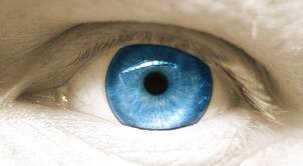Privacy on the Internet is a very slippery idea. We share information voluntarily, through Facebook, Twitter, Foursquare and other social media. Information gets shared involuntarily through hacking, or by companies tracking our purchases and browsing habits to glean clues about how to make us their ideal customer. But Slate has an article today on a new way to learn about people online that is passive, technologically advanced, and nearly impossible to avoid: eye tracking using front-facing cameras.
It sounds like the stuff out of paranoid science fiction, and right now it is. However, as Slate astutely points out, more and more devices have front cameras, and it’s only a matter of time before tablets and phone are powerful enough to watch our eyes as we browse the web.
Here’s what made me wish I had a tin foil hat and some black sunglasses handy:
Once the technology for eye-tracking is in place, it will glean information conveying not onlywhat we read online, but also how we read it. Did our eyes linger for a few seconds on an advertisement that, in the end, we decided not to click on? How do our eyes move as they take in the contents of a page? Are there certain words, phrases, or topics that we appear to prefer or avoid? In the future, will we be served online ads based not only on what we’ve shopped for, but also on the thoughts reflected in our eye movements?
This information will be collected, analyzed and resold to hundreds of companies—advertisers, data analytics providers, and others—across the digital ecosystem in what the industry calls the “mobile marketing value chain.” In theory, they will be anonymous, “nonpersonal” data. But in practice, the anonymity will be easy to penetrate. For example, eye-tracking data collected from tablets and smartphones will be tied to a “unique device identifier” associated with one specific device. These data will also be correlated to accurate location-tracking information, often to the precision of a specific home or commercial building.
This is very scary stuff. As it stands now, Target can tell if you are pregnant based on how much lotion you are purchasing. Imagine what they can sell you when they see how long you look down an aisle. And how often have you already been chased around the web by Zappos’ ads featuring shoes you browsed; imagine when the ad is refined to just the shoes you liked, even if you didn’t indicate your preference directly while browsing? The concept isn’t anything new, but this takes passive tracking to a whole new level, and the worst part is that you can’t directly control it. You can avoid clicking on content or reading an article, but it takes an impossible level of self-control to keep your eyes from glancing at a headline. And forget controlling your reaction. Better start practicing your poker face!
Moving beyond advertising, the first thing that I thought of was a short story by Isaac Asimov called “Franchise“. In it, citizens do not vote. One citizen is chosen to represent the country, and a fictional computer called “Multivac” uses the man’s answers to basic questions to extrapolate the winner of the presidential election. If computers can tell how you really feel from the dilation of your pupils, will Gallop need to conduct polls for politicians? Will Nielsen be able to measure whether you not only watched a television show but enjoyed it or not? And what happens if down the road, someone determines letting us decide things is subject to too much pressure? After all, they know how you should vote on the issues based on your reaction to the keywords…why trust you to make that same decision in a voting booth? Asimov imagined Multivac as a huge underground computer system, but it might very well be a tiny camera, watching your every tweet.
The part of this that makes me really sad is that I don’t know if anything will really change. We already accept so much tracking as part of our everyday lives, will this really be any different? Could you really put down your tablet, or tape all the cameras and erase your browser cookies every hour? Or will we all inevitably shrug, declare “Eh, I have nothing to hide, and besides, these new ads found me a great deal on a pair of shoes” and never consider the darker undertones? Hopefully when and if this technology surfaces the answer is that we will question it, and we will refuse to participate…otherwise we may find that the world is more “Minority Report” than ideal technological utopia.

